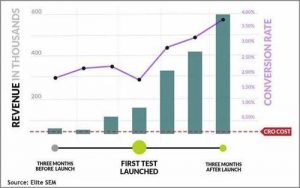— August 1, 2018

There are many games where the player who goes first has a greater likelihood of winning than their opponent. It’s called First-Mover Advantage.
In chess, for example, unless both players are equally-matched mega grandmasters, White has a statistically higher chance of winning. In tennis, the player who serves is more likely to win the point. In order to win a set, a player usually has to ‘break’ the opponent’s serve – i.e. win a game against the inherent first-mover advantage.
In the game of Go, the super-strategic board game invented in China around the 4th Century BC that’s said to be far harder to master than chess, the first person to play has such a greater chance of winning that Player 2 gets a bonus of between 5.5 and 7.5 points.
There’s a school of thinking that maintains the first significant business to serve an uncontested market has an advantage over competitors coming into the space at a later stage. The idea is that since you have the market to yourself, you’re able to build brand ubiquity and loyalty before everyone else. Blue Ocean Strategy, the well-known business book with over 4m sales and available in 40 languages, is basically about securing first-mover advantage.
The First-Mover Advantage

Kodak Brownie box camera
©2005 Håkan Svensson (CC BY-SA 3.0)
There many examples of businesses who pretty much owned a particular market niche by introducing a product or service where none existing before, dominating the segment for years afterward.
One of my favorite examples is Kodak. In 1889 Kodak was the first company to mass-produce cameras. The box-shaped camera came preloaded with film enough for 100 exposures, and when you had finished the roll you had to send the whole camera to Kodak for processing. For more than ten years the only prebuilt, ready-to-shoot camera you could buy was from Kodak.
First-mover advantage can provide business credibility and acclaim. Since you’re the main player in a space without a previous dominant incumbent, customer identification of your product or service centers around your business – and your business only.
The headstart gives you a clear path regarding adverting and public relations. Intellectual property, copyright, patents, and trademarks help bolster first-mover position.
First-Movers Are More Likely To Be Failures
But for every business that succeeded – however briefly – with a first-mover advantage strategy there are hundreds that failed.
Online Bookstores
Most people may think Amazon pretty much invented buying books over the web, right? But in 1992, two full years before Amazon was founded, a gentleman by the name of Charles Stack launched Book Stacks Unlimited.
Search Engines
Google wasn’t the web’s first search engine. In fact it doesn’t even crack the first ten. Before Google was founded in 1998 there were players such as Archie (1990), Excite (1993), Yahoo!, Lycos, and AltaVista (all 1994).
Social Media Channels
Before Facebook, Twitter, Instagram, or Snapchat there were sites such as Six Degrees, Friendster, and MySpace.
Being First Is Expensive
One of the biggest challenges in being first in your market are the expenses you have to bear. Often, these are costs that subsequent competitors may not need to incur. By ‘expense’, I don’t just mean in the financial sense.
For example, one of the problems faced by those early-to-market social media channels was the expensive investments they were forced to make in hardware, networking, and communications. Third-party cloud computing services didn’t really exist at the time, so organizations had no other choice than to build their own. Those early pioneers didn’t have access to pre-built optimized infrastructure like AWS (used by Spotify, Pinterest, Airbnb and Netflix) or Google Cloud (Shazam, Evernote, Domino’s, Feedly, Vimeo) – making life that much harder.
Then there’s the very real and expensive problem of having to educate a market that didn’t exist before you arrived.
Trying to sell a product or service to people having no previous point of comparative reference, or understanding of the problem being solved, is always going to be an uphill struggle. Selling into a new market space mandates first-movers to spend time, money, and effort to educate their audience. What problem does the product or service solve, why do they need it, how is it used, and so on.
Those months/years of educative efforts, of course, will work against you when competitors eventually see the opportunity. They’ll arrive into the new market you’ve spent so much time convincing people of its validity. You’ve made their life easier.
The First-Mover Advantage Myth
It would seem that for many industries, there are more first-mover disadvantages than advantages. Clearly, it’s easier to sell into a pre-educated market than to build one from scratch. Just as it’s easier to improve on someone else’s original idea than start with a clean sheet of paper.
No first-mover business is ever completely insulated from rival challengers. For example, Tesla, one of today’s media darlings, faces increasing competitive pressure in a market space it pretty much created from nothing. The question is whether the automobile manufacturing division of the company can maintain its lead in luxury electric cars while facing the imminent commercial onslaught from established automotive juggernauts (sic) such as VW, Nissan, Ford, BMW – and a gazillion Chinese manufacturers – who are collectively investing tens of billions in the required technology, software, and infrastructure.
While a successful future for electric vehicles, or EVs, seems pretty much a given, companies such as Tesla will increasingly have a tougher time competing. Battery technology and EV drivetrains will inevitably become generic and commoditized – as anti-lock brakes are today. The current ‘sexy innovation’ in EV circles is autonomous driving – an area Tesla is so far behind compared to developers such as Google sister company Waymo it’s untrue. Perhaps Tesla’s future role (and cash cow) lies in the supply of components such as batteries to other manufacturers. Just like how an iPhone today uses a screen made by Samsung.
Ultimately It’s The Market That Decides
Markets aren’t dominated by those who got there first. Eventually, market domination is determined by whoever is first to best meet the needs of the customer. In an evolving market space this means accepting those needs may be unclear today, but will quickly evolve and solidify over time.
Google makes more money from digital advertising sales than any other company on the planet, but it was Yahoo! that invented the Pay-Per-Click (PPC) model. Apple didn’t invent the smartphone, MP3 player, or tablet computer. Microsoft Windows wasn’t the first PC operating system, nor Oracle the first database company. Today, each of these businesses dominates their particular market segments.
Instead of constantly looking to new market opportunities, perhaps a more lucrative – and sustainable – path forward lies in better understanding the pain points of customers in the markets you already serve. Offering a better product or service in the space you already occupy.
The early bird may catch the worm. But it’s the second mouse that gets the cheese.
Business & Finance Articles on Business 2 Community
(129)
Report Post





